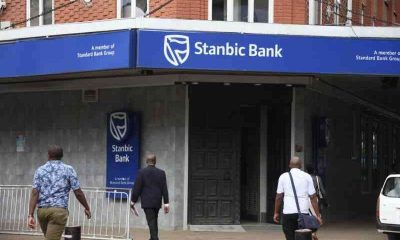Business
FRC to use second-hand car dealers in the war against money laundering

Dealers in second-hand cars will now be forced to reveal the identity of their buyers and sources of their income in the latest move aimed at crushing money laundering syndicates.
The Financial Reporting Centre (FRC) is determined to lay out a legal framework that will compel all car dealers to report all transactions exceeding Sh1 million and even smaller suspicious payments.
The proposal that is only awaiting approval by the Cabinet and Parliament will have second-hand car dealers designated as non-financial reporting institutions together with real estate agents, accountants and gambling joints like casinos.
FRC boss Saitoti ole Maika said that report by a high-powered anti-money laundering task force on risk assessment uncovered that second-hand car industry make transactions worth millions without questioning the source of the buyer’s money.
Investigations have shown that the second hand-car industry is a hotbed of money laundering where customers spending more than Sh1 million simply walk-in to buy or make deposits with the balance being settled in installments.
“Our intention is to mine data on people buying cars from the dealers.” said Mr Maika.
The new rule will have dealers of used cars obligated to disclose details of their buyers including names, addresses, date of birth, ID number, occupation and date of transaction.
The second -hand car industry is 90% of the market share accounting for about Sh70 billion every year but FRC reckons that the industry is flooded with drug dealers and fraudsters who buy cars often in cash and then sell them to clean proceeds of dirty dealings.
“Car dealers have a big challenge because it is an industry that’s not regulated. Other than the NTSA issuing permit prescribing them as second-hand dealers, it is more or less unregulated.” Mr Maika said.
The move by the FRC comes at a time when the country is looking for mechanisms to add more businesses and professions to the list of entities obligated to play a watch dog role on money laundering.
Designated entities will be required to submit to the FRC an annual compliance report by January 31 of the following year. The Proceeds of Crime and Anti-Money Laundering Act (Procamla) requires the designated institutions to report any suspicious or unusual transaction to the FRC .
Kenya Insights allows guest blogging, if you want to be published on Kenya’s most authoritative and accurate blog, have an expose, news TIPS, story angles, human interest stories, drop us an email on [email protected] or via Telegram
-

 Grapevine1 week ago
Grapevine1 week agoAlleged Male Lover Claims His Life Is in Danger, Leaks Screenshots and Private Videos Linking SportPesa CEO Ronald Karauri
-

 Lifestyle1 week ago
Lifestyle1 week agoThe General’s Fall: From Barracks To Bankruptcy As Illness Ravages Karangi’s Memory And Empire
-

 Grapevine3 days ago
Grapevine3 days agoRussian Man’s Secret Sex Recordings Ignite Fury as Questions Mount Over Consent and Easy Pick-Ups in Nairobi
-

 Investigations2 weeks ago
Investigations2 weeks agoEpstein Files: Sultan bin Sulayem Bragged on His Closeness to President Uhuru Then His Firm DP World Controversially Won Port Construction in Kenya, Tanzania
-

 News2 weeks ago
News2 weeks agoAUDIT EXPOSES INEQUALITY IN STAREHE SCHOOLS: PARENTS BLED DRY AS FEES HIT Sh300,000 AGAINST Sh67,244 CAP
-

 Business2 weeks ago
Business2 weeks agoKRA Can Now Tax Unexplained Bank Deposits
-

 Investigations1 week ago
Investigations1 week agoEpstein’s Girlfriend Ghislaine Maxwell Frequently Visited Kenya As Files Reveal Local Secret Links With The Underage Sex Trafficking Ring
-

 News1 week ago
News1 week agoState Agency Exposes Five Top Names Linked To Poor Building Approvals In Nairobi, Recommends Dismissal After City Hall Probe



























